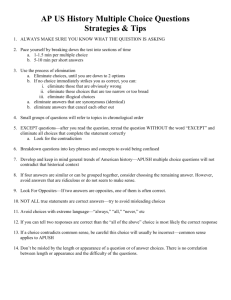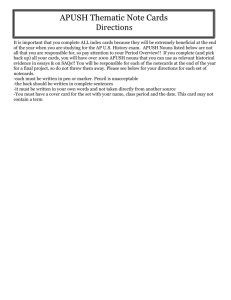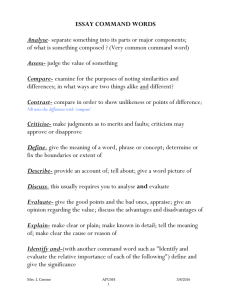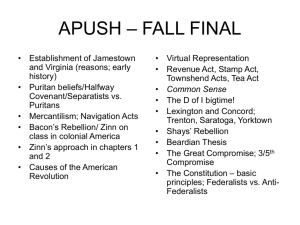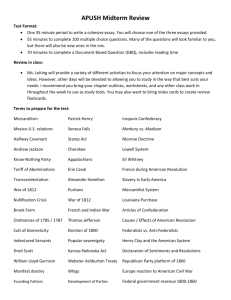APUSH Mrs. Reilly1st Semester: 1st Nine Week Reading
advertisement
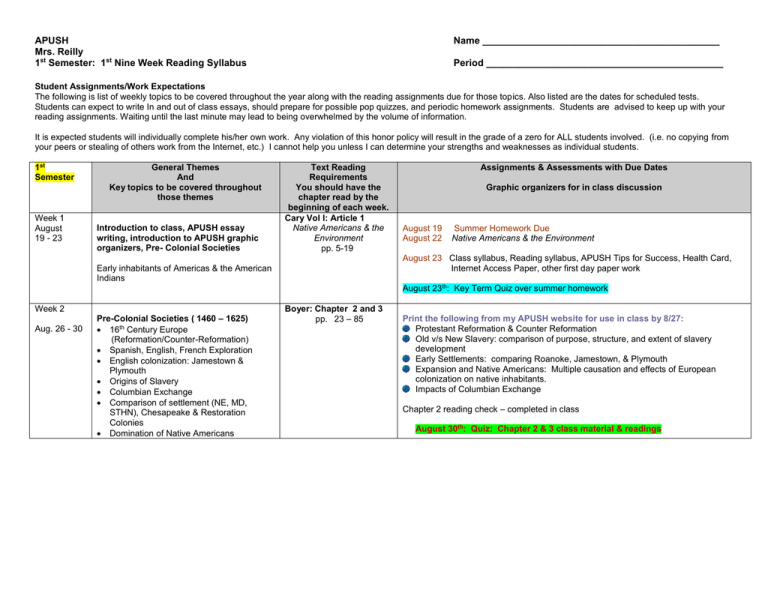
APUSH Mrs. Reilly 1st Semester: 1st Nine Week Reading Syllabus Name ____________________________________________ Period ____________________________________________ Student Assignments/Work Expectations The following is list of weekly topics to be covered throughout the year along with the reading assignments due for those topics. Also listed are the dates for scheduled tests. Students can expect to write In and out of class essays, should prepare for possible pop quizzes, and periodic homework assignments. Students are advised to keep up with your reading assignments. Waiting until the last minute may lead to being overwhelmed by the volume of information. It is expected students will individually complete his/her own work. Any violation of this honor policy will result in the grade of a zero for ALL students involved. (i.e. no copying from your peers or stealing of others work from the Internet, etc.) I cannot help you unless I can determine your strengths and weaknesses as individual students. 1st Semester Week 1 August 19 - 23 General Themes And Key topics to be covered throughout those themes Introduction to class, APUSH essay writing, introduction to APUSH graphic organizers, Pre- Colonial Societies Text Reading Requirements You should have the chapter read by the beginning of each week. Cary Vol I: Article 1 Native Americans & the Environment pp. 5-19 Assignments & Assessments with Due Dates Graphic organizers for in class discussion August 19 August 22 Summer Homework Due Native Americans & the Environment August 23 Class syllabus, Reading syllabus, APUSH Tips for Success, Health Card, Internet Access Paper, other first day paper work Early inhabitants of Americas & the American Indians August 23th: Key Term Quiz over summer homework Week 2 Aug. 26 - 30 Pre-Colonial Societies ( 1460 – 1625) 16th Century Europe (Reformation/Counter-Reformation) Spanish, English, French Exploration English colonization: Jamestown & Plymouth Origins of Slavery Columbian Exchange Comparison of settlement (NE, MD, STHN), Chesapeake & Restoration Colonies Domination of Native Americans Boyer: Chapter 2 and 3 pp. 23 – 85 Print the following from my APUSH website for use in class by 8/27: Protestant Reformation & Counter Reformation Old v/s New Slavery: comparison of purpose, structure, and extent of slavery development Early Settlements: comparing Roanoke, Jamestown, & Plymouth Expansion and Native Americans: Multiple causation and effects of European colonization on native inhabitants. Impacts of Columbian Exchange Chapter 2 reading check – completed in class August 30th: Quiz: Chapter 2 & 3 class material & readings APUSH Mrs. Reilly 1st Semester: 1st Nine Week Reading Syllabus Name ____________________________________________ Period ____________________________________________ Week 3 September 2-6 No school Sept.2 Labor Day Week 4 Colonial America (1625-1700) Puritanism & Pluralism Bacon’s Rebellion Mid-18th Century Colonial Society ( 1660 – 1750) Attempts @ unity & Colonial Wars Glorious Revolution Economics: mercantilism, trade, growth of slavery Government: colonial and imperial policies Social structure: family, farm & town life Culture: The Enlightenment, Great Awakening, immigration Boyer: Chapter 4 pp. 87 - 119 Chapter 3 reading check – completed in class Continuation of Mid-18th Century Colonial Society (1660- 1750) September 9 Sept. 9 – 13 Students should have read chapter 5 by Tuesday in order to complete open book multiple choice questions in class. These will not be taken home for completion. Sept. 11 is a half day for teacher inservice September 16-20 Test: Colonial North America - Chapters 2 – 4 Students can expect a quiz on mercantilism, the Great Awakening, and Enlightenment this week. Thesis Writing Workshop Week 5 Print the following from my APUSH website for use in class by 9/4: Bacon’s Rebellion: How it happened. From authority to individualism graphic organizer: comparing the philosophies of Puritanism, Great Awakening, & Enlightenment thinkers. First Great Awakening Road to Revolution (1750 – 1776) Seven Year’s War & French and Indian War The Colonies in 1763 (turning point) Imperial reorganization: End of salutary neglect Philosophy of the American Revolution Declaration of Independence Continental Congress Boyer: Chapter 5 pp. 121-151 Declaration of Independence Print the following from my APUSH website for use in class by 9/16: Causes and Effects of the French & Indian War A Turning Point in History: 1763 Declaration of Independence: analyzing the purpose, intended audience, roots, and structure and content of the document. Principle or Self Interest: identifying evidence that supports the economic, social, political causes of the Revolution. Chapter 5 Reading Check – completed in class Expect a quiz on the French and Indian War this week!!!! APUSH Mrs. Reilly 1st Semester: 1st Nine Week Reading Syllabus Week 6 September 23-27 The American Revolution & Defining Nationhood (1776 – 1788) War society: Loyalists War Economy Strengths and weaknesses Political Organization: state governments & Articles of Confederation Social Reform: women and slavery Treaty of Paris 1783 Shay’s Rebellion Constitutional Convention: drafting the Constitution Ratification fight Name ____________________________________________ Period ____________________________________________ Boyer: Chapter 6 pp. 153-185 Print the following from my APUSH website for use in class by 9/23: American Revolution: Challenges of the War Who were the Loyalists Why the Colonists Won Treaty of Paris 1783 American Revolution & Social Change Articles of Confederation graphic organizer: analyzing the accomplishments, diplomatic & domestic conundrums, and the issues that made creating solutions difficult. Articles of Confederation : Recalling the Facts The Constitution: Understanding the fears faced by the Founding Fathers and the compromises made while developing the Constitution Governments of a Changing Nation Chapter 6 Reading Check – completed in class September 27 Quiz: Chapters 5 & 6: Class material & readings Week 7 Sept. 30 – October 4 Week 8 October 7 - 11 Homecoming week! Budget your time to stay up on class work! Week 9 October 14 – 18 Launching the New Republic (1788 – 1800) Bill of Rights Federalists v/s Anti-Federalists Washington as President: political difficulties & financial policies Jefferson v/s Hamilton John Adams Presidency: Alien & Sedition Acts, XYZ Affair, Election of 1800 Republican Motherhood Jeffersonianism and the Era of Good Feelings (1801 – 1824) Louisiana Purchase Burr Conspiracy Marshall Court International policy: Impressment, Embargo Act, neutrality rights Madison’s Presidency War of 1812: Causes, Hartford Convention, Conduct of War, Treaty of Ghent, New Orleans Missouri Compromise President Monroe Era of Good Feelings Foreign affairs: Canada, Florida, Monroe Doctrine Nationalism & Economic Expansion (1815 – 1840) Westward movement Economic Revolution: Railroads & Canals The American System & Industrialization, Boyer: Chapter 7 pp. 187 – 217 Print the following from my APUSH website for use in class 9/30: Jefferson v. Hamilton The Evolution of Democracy US Constitution Chapter 7 Reading Check – completed in class Chapter 5 - 7 Test will be on Monday October 7th! Boyer: Chapter 8 pp. 219 -245 Print the following from my APUSH website for use in class 10/7: Republican Values of the Jeffersonian Era President Jefferson’s Philosophies and Actions (A and B) Analyzing Jefferson’s Actions as President The Marshall Court: 4 land mark Supreme Court cases John Quincy Adams: Accomplishments as Secretary of State The Era of Good Feelings: President Monroe . Chapter 8 Reading Check – completed in class October 14th Quiz: Chapter 8 on class material and readings Boyer: Chapter 9 pp. 247 – 275 Print the following from my APUSH website for use in class on 10/15: “End of Homespun” Document Set and analysis questions Building Nationalism: identifying the events that contributed to a greater sense of independence and nationhood. Examining the economic and political impacts of those events. APUSH Mrs. Reilly 1st Semester: 1st Nine Week Reading Syllabus END OF 1st 9 WEEKS Second 9 Weeks Week 1 October 21-25 Name ____________________________________________ Period ____________________________________________ labor movements, women, social mobility, cotton revolution Panic of 1819 Revolution of Social Relationships The Age of Jackson (1828 – 1848) Jacksonian Democracy: the common man 2nd party system Internal improvements Bank War States’ rights & the nullification Crisis Jackson v/s Calhoun October 10th – 1st Nine Weeks Key Term Test (Worth two test grades!) Boyer: Chapter 10 pp. 277 – 307 Print the following from my APUSH website for use in class on 10/21: Evolution of Democracy graphic organizer: Comparing the economic, political, and social philosophies of Jeffersonian and Jacksonian Democracy. Jacksonian Politics Jacksonianism: The era of the common man The Second Great Awakening / Religious Reform in the Antebellum Era Purifying the Nation worksheet form the APUSH website.
